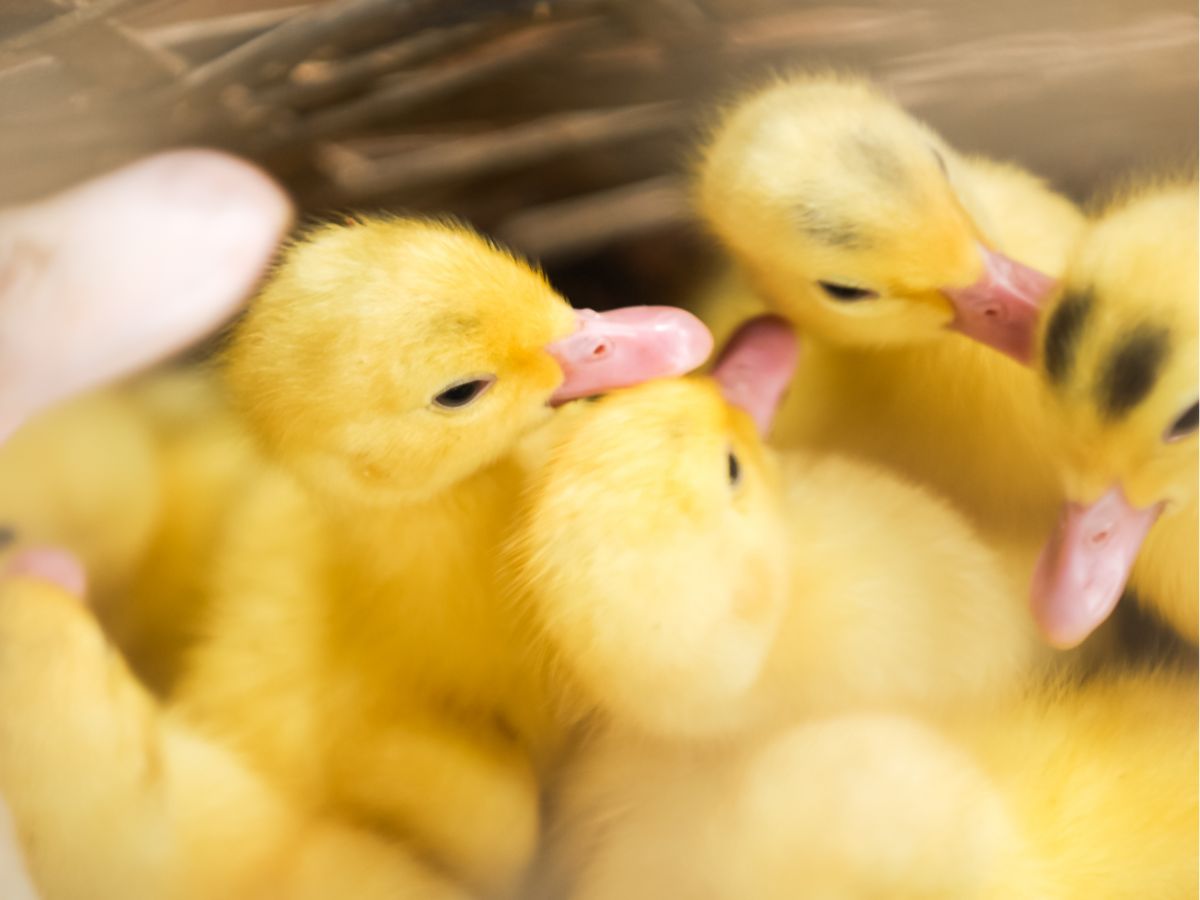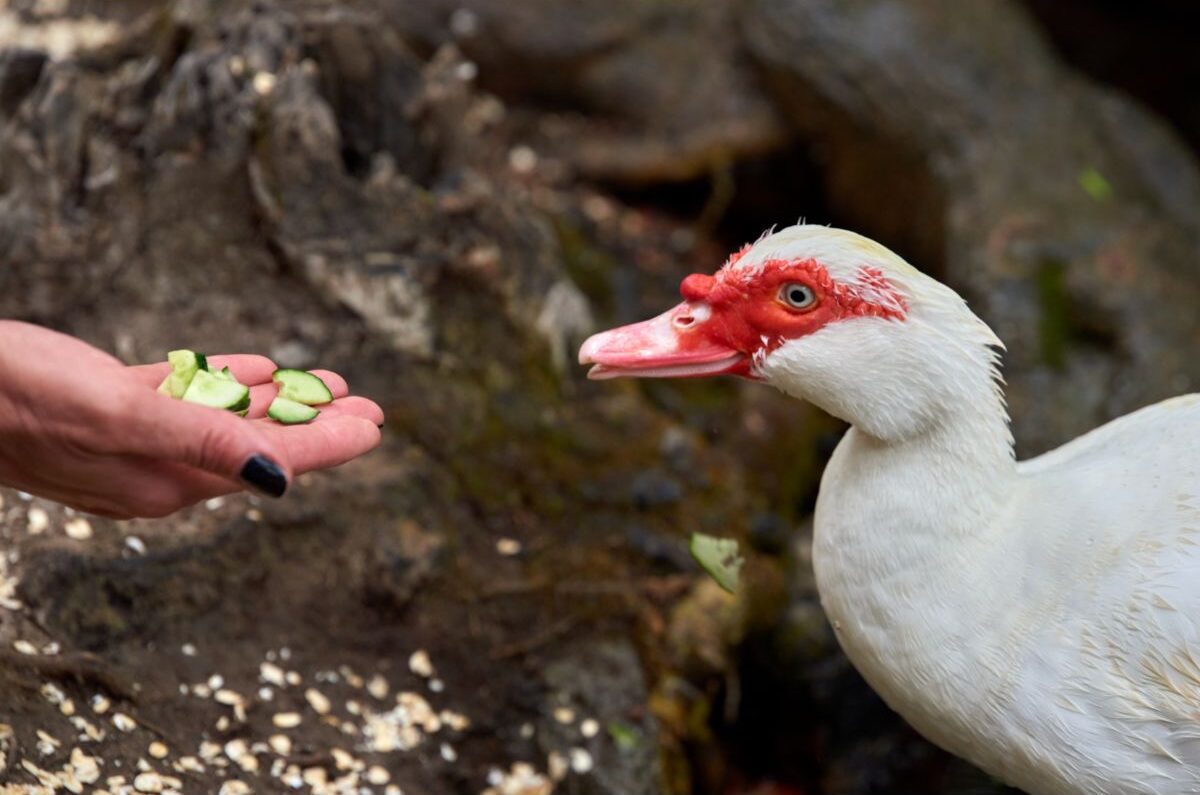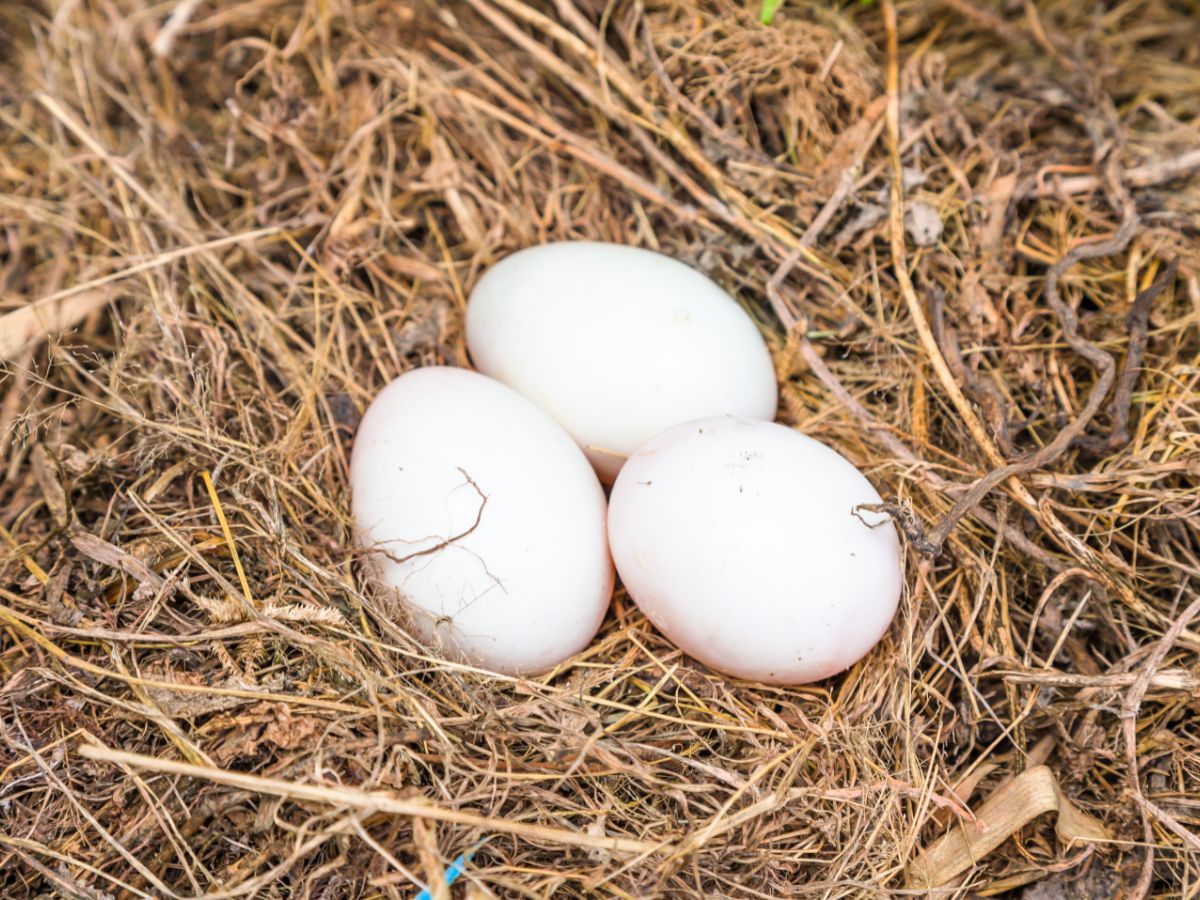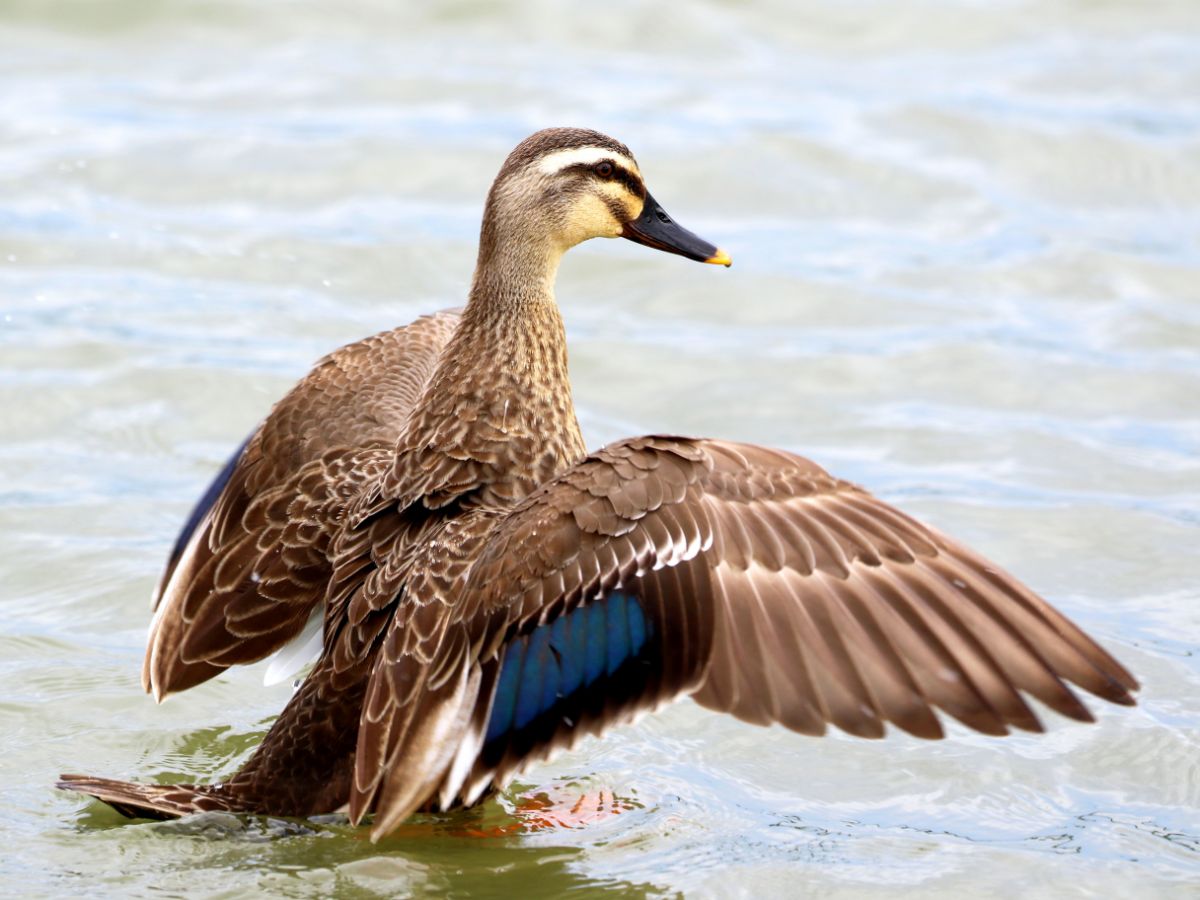There is probably nothing cuter than a yellow bundle of fluff waddling in your backyard. You simply cannot ignore the irresistible cuteness of a ducking, but how do you raise ducklings?
- Prepare A Safe Environment To Raise Your Ducklings
- Set Up A Brooder Area For Ducklings
- Keep Your Duckling Brooder Clean
- Monitor The Brooder Temperature In The Duckling Brooder
- Introduce Your Ducklings To Water
- Feed Your Ducklings The Right Food
- And More …
Contents
1. Prepare A Safe Environment To Raise Your Ducklings
You may be super excited to order your first batch of fluffy ducklings to take back home with you, but there are a few things to consider. Firstly, make a call to your local municipality and check whether you are allowed to house ducks in your area.
There are particular rules for different States, and you don’t want to have your new pets removed because you broke the law. It may break your heart to become fond of your new flock of cuteness and then be forced to rehome them.
You also need to consider whether you have an environment fit for your ducklings. Remember that they will not remain ducklings for long, and you must ensure that your backyard comfortably accommodates a flock of grown ducks.
The number of ducklings you adopt depends entirely on the amount of space you have available. Each duck will require roughly four square feet of space, besides the space you will need for your duck house.
Ducks do not do well in the cold, so you will need a duck house that will provide space for female ducks to lay their eggs and enough sleeping space for all the adults. A duck house is also crucial in protecting your friendly fowl from predators.
Your backyard will need to be a secure, enclosed space. Remember that ducks are rather noisy pets, so it may be in your best interest to check whether your neighbors will tolerate this.
One of the crucial requirements ducklings need is lots of water for drinking and, as they grow bigger, for splashing about. Consider whether you are willing to set up an old bathtub or a kiddies’ pool in your backyard to provide your growing ducklings with plenty of wet fun.
Once you are satisfied that you can provide a good home for your ducklings, go ahead and research a reputable breeder. Ask your breeder about which vaccinations the adult ducks have gotten and answer any questions you may have about the vaccinations you need to get for your ducklings. You want to purchase ducklings who are in good health.
2. Set Up A Brooder Area For Ducklings
Whether you are getting your first flock of ducklings or your Mommy duck has just hatched her first set of ducklings, you will need to set up a brooder area.
Separating your ducklings from the general population will protect them from being trampled on by other adult fowls, and unfortunately, many ducklings are lost due to maternal neglect.
A brooder is simply an enclosed area where ducklings can be kept safely separate from other pets and away from predators. Your ducklings will be housed in the brooder for about six to eight weeks.
Ensure that your brooder has sufficient space for the number of ducklings as they grow fast! It should be at least 24-36 inches high to avoid any ducklings jumping out and escaping. Allow at least three-square feet of space per duckling.
Place your brooder where other poultry pets can safely observe the new arrivals, this will help ease any tension they may feel at having newcomers join them. By the time you allow the new ducklings to integrate, your other chickens, ducks, or geese would have had the time to acquaint themselves with the little ones.
3. Keep Your Duckling Brooder Clean
Fill the base of your brooder with a bedding material such as straw, pine shavings, shredded newspaper, etc. You will need to change this bedding very often as ducklings tend to make a huge mess!
Every few days, do a thorough clean and disinfect the brooder. Keeping the brooder as clean as possible will help prevent a range of diseases, so be diligent with this task to ensure your ducklings grow to be strong and healthy.
4. Monitor The Brooder Temperature In The Duckling Brooder
Your newly hatched ducklings do not have enough feathers to keep them sufficiently warm, so you will need to install a heat lamp to regulate the temperature for the first two weeks. Generally, you can set your heating lamp to 90 degrees, reducing the heat by 5 to 10 degrees every week until the temperature reaches 70 degrees.
This is just a guide, and you must consider the general weather outside. If it is in the middle of Winter, your ducklings may require the heat lamp to be on a higher setting for longer.
You can monitor how your ducklings are reacting to the temperature; if they are huddling tightly together, chances are that they are getting too cold. They may get way too hot if you notice that they are trying to avoid being directly under the lamp.
Monitor the temperature with a thermometer. At around three to five weeks old, your ducklings may be allowed to wander outside the brooder only on sunny days. Do not allow them to wander about unsupervised as they may become prey to predators or get picked on by other backyard pets like chickens.
5. Introduce Your Ducklings To Water
Your ducklings will be ready to swim when their glands produce enough oil to keep water away from their skin. Allow 6 to 8 weeks before your ducklings are ready to leave the brooder altogether.
You can slowly introduce them to water at around one week old, but they need to be returned to the brooder to get warm immediately after. After about eight weeks, ducklings will be much better swimmers.
Never allow your ducklings to swim unsupervised until they are strong and capable. The first swimming attempt should be at a water depth where ducklings can still touch the bottom. Allow them to walk through some shallow water to get used to it.
Be aware of the weather as letting your ducklings swim in cold water is not a good idea; they should be able to warm up efficiently under the heat lamp quickly after swimming.
6. Feed Your Ducklings The Right Food
From as young as a day up to around three weeks old, your ducklings will be able to eat waterfowl starter crumbs*. Whatever brand of food you choose mustn’t contain medications such as antibiotics.
Ducklings are ferocious eaters and will very easily overdose on the medications contained in their food. Starter feed contains between 20 to 24 percent protein and provides a great nutritional start.
You will need to swap your feed at around three weeks old to a grower feed with a lower protein content of between 15 to 18 percent.
You may be tempted to buy your ducklings chick feed, but this is not recommended for young ducklings, as some essential vitamins are missing in chick feed formulations that ducklings will need.
Chick feed lacks sufficient amounts of vitamin and niacin, which makes it inappropriate for ducklings. If you only have access to chick feed, you can add brewers’ yeast to the feed to increase the vitamin B content.
You must determine whether adding grit to your ducklings’ diet is a good choice. Grit acts as an aid for digesting food, and when your ducklings are foraging in a natural environment, they will ingest bits of rocks and sand, which helps them to chew up their food.
If your ducklings are still in the brooder and have only been fed commercial food, there is no need to chew up any other food, which makes grit unnecessary.

7. Feed Your Ducklings The Right Treats
You may be tempted to feed your ducklings little treats as they grow. You can indulge them with fruit and vegetable treats when they are fully feathered. Certain vegetables and fruits such as peas, non-citrus fruits, Zucchini, corn, and leafy greens are great choices. Since ducks are omnivores, you can also feed them dried worms when available.
Foods that you should avoid feeding your ducklings include donuts, popcorn, crackers, bread, or cereal. These foods don’t contain adequate nutritional value for your growing ducklings, and the left-over crumbs easily attract pests such as raccoons and rodents.
8. Follow A Feeding Schedule For Ducklings
Young ducklings can digest food at a rapid pace! You should feed your ducklings on demand during the first few weeks of life. Be sure to clean out any food scraps that are left behind.
Perhaps the best way to ensure that your darlings never go hungry is to have their food readily accessible. You can check on them at least three times daily to ensure they have not depleted their supply. Don’t worry about overfeeding your ducklings, as they will only demand food when hungry.
9. Introduce Your Ducklings To The Flock
Once your new ducklings are about eight weeks old and have feathered out quite a bit, it’s time for them to leave to the brooder. At this stage, you may have already allowed them supervised play time around your backyard.
If these are your first set of ducks, you can allow them to find their feet by themselves, ensure they know where to find shelter in the duck house, and follow a feeding schedule.
Take precautions if you already have other poultry like geese, or chickens in your backyard. It is far easier to introduce your ducklings to a flock of female ducks, and you shouldn’t anticipate any drama.
Take caution when introducing ducklings to a flock that has males during the mating season of Spring and Summer. You will need to be conscious of the duck “pecking order” and ensure that you do not have too many competing drakes.
It works well to make the brooder visible to the rest of the poultry family before releasing your babies; this will reduce the shock of having new arrivals. Chickens are very particular about their pecking order and may not take too kindly to the new arrivals.
How Fast Do Ducklings Grow?
It takes a lot of hard work and commitment to raise ducklings but they do grow very fast! You can expect it to take only eight to twelve weeks for your sweet little duckling to be considered a young adult.
Diseases Ducklings May Contract
Even though ducklings are hardier creatures compared to chickens, they may encounter a few health problems. It is critical to recognize the onset of disease and know how to treat or prevent it.
Knowing the key symptoms to look for will help you to prevent or treat diseases before they become fatal.
Riemerella Anatipestifer (New Duck Disease)
The first symptoms of this deadly bacterial infection include sneezing and mild coughing. You will notice a mucous discharge from the nose, eyes, and watery green feces. In the late stages of the infection, your ducklings will experience head tremors and depression.
This infection is highly contagious and usually leads to death, with survivors permanently stunted. They often end up laying on their backs while paddling their legs; unfortunately, at this stage, death is imminent. If you notice symptoms in one duckling, separate her from the flock immediately to avoid contamination.
You want to prevent this kind of infection at all costs. A live vaccine and bacterin are available for young ducks and those of breeding age, protecting their ducklings up to three weeks. Check with your supplier that all the ducks they breed are up to date with the appropriate vaccines.
It is essential to keep your ducklings’ living environment clean and disinfected. Ducklings are notoriously messy, but you must take extra care when they are young and vulnerable.
Should you notice any of the symptoms in the flock, speak to your vet about adding Enrofloxacin or similar medicine into your ducklings’ drinking water. This may prevent death in the early stages of the disease.
Duck Plague
Ducklings as young as seven days old, up until maturity, are at risk of contracting the Duck Plague. This virus is caused by infection from other affected ducks or a contaminated environment.
Duck Plague causes internal hemorrhaging, and adult ducks seem to have a higher mortality rate. Surviving ducklings, however, will carry the latent virus into adulthood and experience outbreaks later in life.
If you notice ducklings who have blue beaks, show signs of dehydration, have sudden weight loss, and have blood in their stools, you may have an outbreak of Duck Plague.
Duck Plague is transmitted via contact with wild waterfowl, so the only prevention is to limit contact of your domestic pets with these waterfowl. Unfortunately, there is no treatment for Duck Plague.
Other diseases to look out for:
- Avian Cholera
- E. coli Infections
- Botulism
- Aflatoxin Poisoning
- Toxin Ingestion
- Aspergillosis
- Heavy Metal Toxicity
- Egg-Binding
- Bumblefoot
Benefits Of Raising Ducklings
Despite the hard work involved in raising ducklings, it is an enriching experience. Your ducklings will form a bond with you from a young age that will last into adulthood. These little bundles of fluff are bursting with personality, and you will soon realize that no two ducklings are alike.
Ducks are generally messy creatures, but this is to your advantage if you are an avid gardener, as their manure makes an excellent fertilizer for your veggie garden or lawn. Unlike other pets such as chickens, ducks will not wreak havoc on your plants.
They make excellent gardening companions as they are living pest control experts. Ducks will feast on worms, spiders, grasshoppers, and slugs, which greatly help keep your garden flourishing.
Ducks are also excellent “guard dogs” to their smaller livestock companions, such as chickens, and are known to scare off predators. Certain duck breeds, such as Indian Runner Ducks, are more protective than other breeds.
Keeping a flock of ducks is a deterrent for predators and would-be burglars on your property as they are both intelligent and very loud! Their flapping wings and loud honking will alert the neighborhood that something is amiss.
An obvious benefit of raising ducklings is that eventually, they will mature and produce nutritious eggs for you and the family to enjoy. Depending on the breed, a hen duck can produce about five to six weekly eggs.
Conclusion
Raising ducklings is a lot of work, but it is rewarding to see your little flock grow up. Keeping your ducklings safe, well-fed, and healthy is a full-time job, but being prepared for the journey will stand you in good stead. Your bundles of fluff will thank you later.




